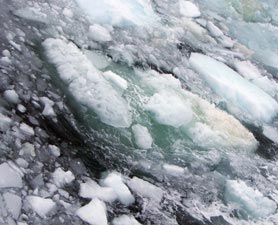A huge methane gas leak in the Arctic was discovered
A large amount of methane is leaking from a huge hole that has just been discovered below the permafrost of the Arctic Ocean. If current leakage continues, this mass of methane will accelerate global warming.
The sound detector (sonar) is the only means to explore and detect massive methane masses located under this permafrost.
 The Arctic Ocean's bottom contains an enormous amount of carbon (C), and experts fear that leaking them in the form of methane (CH 4 ) will stimulate the earth's temperature to rise. Methane is a greenhouse gas that is 30 times more harmful than CO2.
The Arctic Ocean's bottom contains an enormous amount of carbon (C), and experts fear that leaking them in the form of methane (CH 4 ) will stimulate the earth's temperature to rise. Methane is a greenhouse gas that is 30 times more harmful than CO2.
These surveys and studies have been carried out by a group of University of Alaska scientists on the eastern Siberian seabed (about 2 million square kilometers of the Arctic ocean) since 2003. The results for Seeing that gas is leaking in large quantities and fast speed is beyond the scientists' expectations. This situation will continue to seriously affect the global climate change process.
Previously, scientists focused on the gas escaping from the ice surface on the mainland, and they thought that this permafrost would be an impregnable 'fence'. 'confine' methane at the bottom.
More than 80% of seawater at the bottom and half of the surface water surveyed contains 8 times higher methane content than normal seawater.
This leak is because the ice layer at the bottom is now showing abnormal signs, and if it continues to be so unstable, the amount of methane released is much greater, which will seriously threaten ". the safety of the ecosystems on the earth.
- Melt ice will liberate hundreds of millions of tons of methane gas
- The Arctic Ocean emits greenhouse gases
- Arctic ice lake caught fire mysteriously
- Graphene films can turn methane gas into an energy source
- The ground heaves like a bubble
- Arctic melting ice could cause $ 60,000 billion in damage
- Arctic waves
- NASA detects huge holes on Earth?
- Siberian lakes, a source of huge methane emissions
- The lake is bubbling, burning in the Arctic
- The century oil spill still has consequences
- Find materials that 'hold' methane gas
 Is the magnetic North Pole shift dangerous to humanity?
Is the magnetic North Pole shift dangerous to humanity? Washington legalizes the recycling of human bodies into fertilizer
Washington legalizes the recycling of human bodies into fertilizer Lightning stone - the mysterious guest
Lightning stone - the mysterious guest Stunned by the mysterious sunset, strange appearance
Stunned by the mysterious sunset, strange appearance